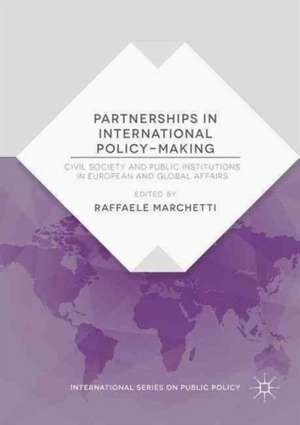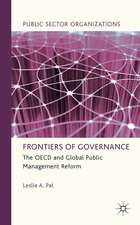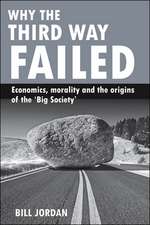Partnerships in International Policy-Making: Civil Society and Public Institutions in European and Global Affairs: International Series on Public Policy
Editat de Raffaele Marchettien Limba Engleză Hardback – 4 noi 2016
| Toate formatele și edițiile | Preț | Express |
|---|---|---|
| Paperback (1) | 640.06 lei 6-8 săpt. | |
| Palgrave Macmillan UK – 27 iun 2018 | 640.06 lei 6-8 săpt. | |
| Hardback (1) | 644.30 lei 6-8 săpt. | |
| Palgrave Macmillan UK – 4 noi 2016 | 644.30 lei 6-8 săpt. |
Din seria International Series on Public Policy
- 15%
 Preț: 638.76 lei
Preț: 638.76 lei - 18%
 Preț: 1106.79 lei
Preț: 1106.79 lei - 15%
 Preț: 643.00 lei
Preț: 643.00 lei - 18%
 Preț: 1222.80 lei
Preț: 1222.80 lei - 18%
 Preț: 1223.55 lei
Preț: 1223.55 lei - 8%
 Preț: 446.23 lei
Preț: 446.23 lei -
 Preț: 225.51 lei
Preț: 225.51 lei - 15%
 Preț: 505.96 lei
Preț: 505.96 lei - 15%
 Preț: 472.19 lei
Preț: 472.19 lei -
 Preț: 387.38 lei
Preț: 387.38 lei -
 Preț: 382.95 lei
Preț: 382.95 lei -
 Preț: 386.00 lei
Preț: 386.00 lei -
 Preț: 384.09 lei
Preț: 384.09 lei - 9%
 Preț: 634.52 lei
Preț: 634.52 lei - 18%
 Preț: 786.52 lei
Preț: 786.52 lei - 18%
 Preț: 780.19 lei
Preț: 780.19 lei -
 Preț: 350.50 lei
Preț: 350.50 lei - 18%
 Preț: 889.75 lei
Preț: 889.75 lei - 18%
 Preț: 778.01 lei
Preț: 778.01 lei - 18%
 Preț: 731.10 lei
Preț: 731.10 lei - 18%
 Preț: 728.91 lei
Preț: 728.91 lei - 15%
 Preț: 696.82 lei
Preț: 696.82 lei
Preț: 644.30 lei
Preț vechi: 758.01 lei
-15% Nou
Puncte Express: 966
Preț estimativ în valută:
123.29€ • 129.31$ • 102.63£
123.29€ • 129.31$ • 102.63£
Carte tipărită la comandă
Livrare economică 01-15 aprilie
Preluare comenzi: 021 569.72.76
Specificații
ISBN-13: 9781349949373
ISBN-10: 134994937X
Pagini: 354
Ilustrații: XVII, 316 p. 29 illus. in color.
Dimensiuni: 148 x 210 x 24 mm
Greutate: 0.53 kg
Ediția:1st ed. 2017
Editura: Palgrave Macmillan UK
Colecția Palgrave Macmillan
Seria International Series on Public Policy
Locul publicării:London, United Kingdom
ISBN-10: 134994937X
Pagini: 354
Ilustrații: XVII, 316 p. 29 illus. in color.
Dimensiuni: 148 x 210 x 24 mm
Greutate: 0.53 kg
Ediția:1st ed. 2017
Editura: Palgrave Macmillan UK
Colecția Palgrave Macmillan
Seria International Series on Public Policy
Locul publicării:London, United Kingdom
Cuprins
Part I. Context.- Chapter1. International Policy Partnerships with Civil Society: Risks and Opportunities; Raffaele Marchetti.- Chapter 2. The Limits of Global Governance: Transnational Neopluralism in a Complex World; Philip Cerny.- Part II. Global.- Chapter 3. How participatory is global governance of trade and environment? The cases of WTO and UN Climate Summits; Marcel Hanegraaff and Arlo Poletti.- Chapter 4. Civil society-public institution relations in global food policy: the case of FAO and the CFS; Nora McKeon.- Chapter 5. IFAD Policy engagement and civil society: The case of IFAD; Lauren Phillips.- Chapter 6. Can Human Rights NGOs be Trusted in the Corridors of the United Nations and International Criminal Justice Institutions?; Lyal S. Sunga.- Chapter 7. Civil Society and the UN Security Council: Advocacy on the Rwandan Genocide; Kseniya Oksamytna.- Part III. EU.- Chapter 8. Asymmetric patterns in the Civil Society’s access to the European Commission: The cases of DG FISMA and Dg TRADE; Giuseppe Montalbano.- Chapter 9. European Commission’s sing‐along: civil society as a last resort in the European Union Emissions Trading Scheme debate: The case DG CLIMA; Pawel P. Pustelnik.- Chapter 10. Civil Society in the EU development and human rights agenda: The case of DG DEVCO-EIDHR; Chiara Pierobon.- Chapter 11. From Window-dressing to Windows of Opportunity: Civil Society Actors in the EU DG HOME Security Regime; Georgios Kolliarakis.- Chapter 12. NGOs and the EU’s responses to emergencies and crises. An analysis of ECHO’s and member states’ support; Daniela Irrera.- Part IV. Controversies.- Chapter 13. Foreign Government Support for Threatened Civil Societies: Helpful or Harmful?; Clifford Bob.- Chapter 14. Foreign Policy by Proxy: Democracy and Human Rights Promotion Through the Engagement with Civil Society; Raffaele Marchetti.- Chapter 15. “Feeding the Trojan Horse” Public International Aid to NGOs as a political tool of international relations; Igor Pellicciari.
Recenzii
“Marchetti considers more descriptively how modern foreign policy, particularly in areas such as the promotion of democracy and human rights, is increasingly being wielded by proxy through engagement with civil society. Such interactions, he concludes, provide opportunities and risks and it is as well to be aware of both. … a fascinating collection of analyses.” (Martin Westlake, European Political Science, June, 2017)
Notă biografică
Raffaele Marchetti is Senior Assistant Professor in International Relations at LUISS, Rome, Italy, and is an expert on global governance, international public policies, NGOs, and peacebuilding. Among his publications are The Rules of the Global Political Game; Cooperation and Competition between Governments and NGOs; Global Democracy; Civil Society, Ethnic Conflicts, and the Politicization of Human Rights; Conflict Society and Peacebuilding.
Textul de pe ultima copertă
This book analyzes how international organizations and the European Union engage with civil society to pursue their policy goals. Multi-stakeholder initiatives, private-public partnership, sub-contracting, political alliances, hybrid coalitions, multi-sectoral networks, pluralist co-governance, and indeed foreign policy by proxy are all considered. Bringing together the most advanced scholarship, the book examines trade, environment, development, security, and human rights with reference to both EU and global institutional settings such as the WTO, UN Climate Summits, FAO, IFAD, ICC, UNHRC, UNSC, and at the EU level the DG FISMA, TRADE, CLIMA, DEVCO, HOME and ECHO. The book also studies the use of NGOs in the foreign policy of the EU, USA, and Russia. This changing politics and the polarized debate it has generated are explored in detail.
Raffaele Marchetti is Senior Assistant Professor in International Relations at LUISS, Rome, Italy, and is anexpert on global governance, international public policies, NGOs, and peacebuilding. Among his publications are The Rules of the Global Political Game; Cooperation and Competition between Governments and NGOs; Global Democracy; Civil Society, Ethnic Conflicts, and the Politicization of Human Rights; Conflict Society and Peacebuilding.
Caracteristici
Examines the cooperative side of the relationship between societal actors and public institutions, which is often overlooked in traditional civil society scholarship Analyses different policy areas in parallel both at the global and European level, including trade, environment, development, security, and human rights Brings together some of the most advanced and significant recent scholarship on the theme of civil society in global governance















